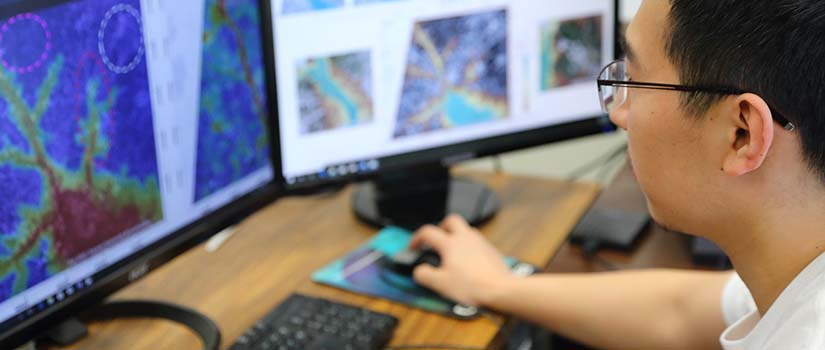In the Department of Geography, you’ll unearth where things happen, why things happen where they do and how to discover and change those patterns — insights that will help you build healthy communities and a more livable Earth.
Why Study Geography?
With a degree in geography, you’ll understand the environmental, social and political forces that shape our world — and the applications are practically limitless. You could help fight rising sea levels and changing climates. You could learn how to mitigate the effects of natural disasters and manage natural resources. You could shape the future of cities and infrastructure. You could use satellite imagery and geographical information science mapping tools to defend human rights.
The Department of Geography’s programs prepare you for the future by combining a traditional liberal arts education with a thorough overview of geographic concepts and techniques. You will master reasoning, analysis and critical thinking, and you will gain in-depth expertise in geographic concepts and technical skills in weather and climate, landforms, environmental change, urbanization, migration, political boundaries and economic development.
What We Teach
Our studies and expertise are focused in four broad areas.
Physical geography investigates patterns and processes associated with Earth, its atmosphere and its bodies of water, and it explores the causes and consequences of environmental variability over time and space. Specialized faculty expertise includes climatology and meteorology, fluvial and aeolian geomorphology, hydrology, biogeography and landscape ecology.
Human geography answers questions of identity, social difference and inequality in diverse geographical contexts. Human geographers examine how people construct social meanings and social identities through space and how they enforce, contest and negotiate the power relations embedded in their environments. They also explore how conflict, immigration, economic development and governments change human environments and landscapes. Research and teaching topics include urbanization, cultural landscapes, globalization, migration, economic geography and world regions.
Environment-society relationships explore how human societies and natural environments interact to understand how people adapt to and shape changing environmental conditions. Our faculty members embrace an integrative perspective that considers complex interrelationships between natural systems, human behavior and systems of governance on local and global scales. And they specialize in myriad topics, including political ecology, human adaptation to environmental change, natural resource use and management and environmental hazards.
Geographic information science, or GIS, engages with a wide spectrum of geospatial technologies, applications and methodologies to produce a digital earth. Our GIS faculty and staff use geospatial techniques to address geographic questions about hazards, public health, population, environment and climate change. Faculty research focuses on photogrammetry, satellite image analysis, light detection and ranging, GIS modeling, geovisualization, spatial programming and big data. We also lead the campus GIS program and the United States Geospatial Intelligence Foundation’s GEOINT Certificate program at South Carolina. Students can take general and specialized courses in geographical information systems, remote sensing and cartography.
Many of our courses tie in with the university’s interdisciplinary programs, including the Global Studies, Environmental Studies and Cyber Intelligence programs. And our introductory courses fulfill Carolina Core requirements.
Who We Are
Our full-time faculty members have deep teaching expertise and are engaged in interdisciplinary programs across the university. Their research interests run the gamut of topics in contemporary geography, including climate change, urban and economic development, land use, population and migration, social theory, spatial analysis and social justice.
Our graduates excel in many different careers: They’re city planners, climate scientists, hydrologists and GIS mapping specialists, among others. And they work for a broad range of agencies, such as the National Park Service, NASA, the United States Department of Housing and Urban Development and many nongovernmental and private organizations. And many of our doctoral students become distinguished faculty at leading universities and researchers in community organizations.
